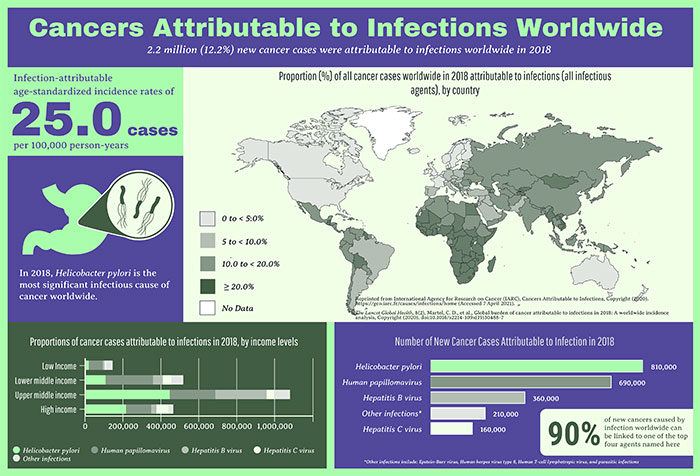On this page...

Rao L . Divi, PhD
Program Director, Methods and Technologies Branch,
Technologies for low-resource settings
divir@mail.nih.gov

Tram Kim Lam, PhD, MPH
Branch Chief, Environmental Epidemiology Branch
Environmental Exposures, Health Disparities, Understudied Populations, Infection-related Cancers
lamt@mail.nih.gov

Vaurice L. Starks, BS
Program Director, Environmental Epidemiology Branch
HIV-related Malignancies Studies, HPV Infection and Associated Cancers, Virally-mediated Carcinogenesis
starksv@mail.nih.gov

Mukesh Verma, PhD
Chief, Methods and Technologies Branch
Biomarkers, Epigenetics, Risk Assessments
vermam@mail.nih.gov
Overview
Based on the most recent data from GLOBOCAN, an estimated 2.3 million infection-attributable cancer cases were diagnosed in 2020. Additionally, there is some evidence suggesting that multiple infections (e.g., co-infection) may also play a significant role in cancer initiation, development, and progression. Our knowledge of the underlying mechanisms of cancer induction by infectious agents (either independently or in combination), interactions between the environment and host genetics, and potential roles of cofactors (known and unknown) is limited and warrants further elucidation. Moreover, technological advances have led to the discovery of previously unknown and unsuspected oncogenic infections in recent years, prompting the idea that additional infection-associated cancers might still be discovered.
Epidemiologic studies play important roles in answering both old and new questions, which augment current knowledge and open new areas of research in infectious agents and cancer. Understanding the role of infection in cancer may result in discoveries that lead to better diagnosis, prevention, treatment of cancers, and increased survival, particularly in countries with limited resources.

Figure: An infographic of 2018 Global Infection-Related Data. For infections that attributed to cancer incidence, 90% of those were H. pylori, hepatitis B and C viruses, and human papillomaviruses. 2.2 million (12.2%) of new cancer cases were attributable to infections wordwide in 2018. Infection-attributable age-standardized incidence rates of 25.0 cases per 100,000 person years. In 2018, Helicobacter pylori is the most significant cause of cancer worldwide. Source: de Martel C, Georges D, Bray F, Ferlay J, Clifford GM (2020). Global burden of cancer attributable to infections in 2018: a worldwide incidence analysis. Lancet Glob Health. (free full text available) https://www.sciencedirect.com/science/article/pii/S2214109X19304887?via%3Dihub.
Funding Opportunities
EGRP joins with other NCI Divisions, Offices, and Centers and other Institutes and Centers at the National Institutes of Health (NIH) to fund grant applications submitted in response to notices of funding opportunities.
View other EGRP, NCI, and NIH funding opportunities
EGRP encourages investigator-initiated grant applications on infectious agents and cancer.
The NIH's National Institute of Allergy and Infectious Diseases (NIAID) and Fogarty International Center also contain information about research funding opportunities related to infectious agents.
Research Resources
- NIAID Research Resources
A compilation of scientific literature, laboratory and clinical research support and tools, and training opportunities. - NIH Common Fund Human Microbiome Project
Provides links to research resources enabling comprehensive characterization of the human microbiota and analysis of their role in human health and disease.
Public Resources
- NCI Fact Sheets
- Strategic Plan for Trans-NIH Research to Cure Hepatitis B
- World Health Organization - Global Health Observatory

Links to reports containing statistics for key health indicators on an annual basis.
EGRP-Supported Infectious Agents and Cancer Grants
EGRP-Supported Events
EGRP is dedicated to ensuring that our recorded webinars comply with Section 508 of the Rehabilitation Act (as amended) for individuals who are hearing and sight impaired. If you encounter any recorded webinar that does not meet your needs, please feel free to reach out to NCIEpiCommunications@mail.nih.gov.